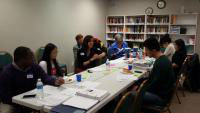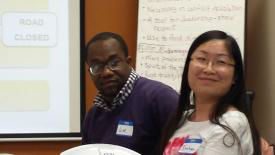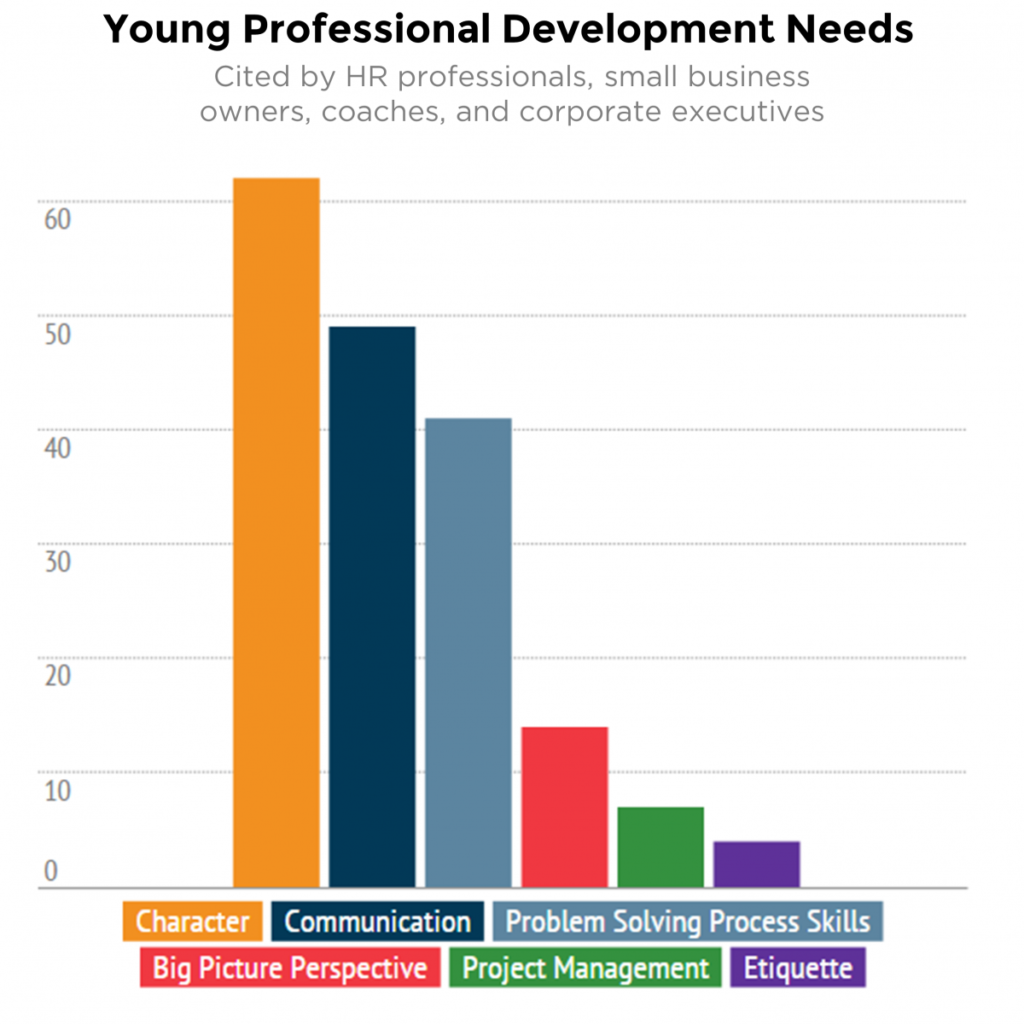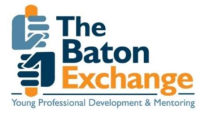Career Competency Workshops
 Soft skills are typically not taught in college but are essential for career and life success. Employers note many of these soft skills as essential for doing well on the job. An MIT study revealed that 85% of career competency is tied to soft/people skills, and 15% to technical skills. Our career competency training focuses on the 85%. Those starting with good soft skills will advance at a faster rate than their peers who lack soft skills.
Soft skills are typically not taught in college but are essential for career and life success. Employers note many of these soft skills as essential for doing well on the job. An MIT study revealed that 85% of career competency is tied to soft/people skills, and 15% to technical skills. Our career competency training focuses on the 85%. Those starting with good soft skills will advance at a faster rate than their peers who lack soft skills.
Personal Vision Statement & Time Management
The exercise of creating a Personal Vision Statement can help you clarify a sense of direction, purpose, and prioritization. Implementing your Personal Vision Statement using actionable steps helps you manage your time and bring balance to your life. In this workshop, trainees learn how to create a life vision statement and actually get started working on one.
Investing Forward: A Generosity Journey
Increase your impact footprint! Life is so much more than just about us. When we learn how to invest in others by giving back through our time, talent, and treasure, we can extend the impact we can have in the lives of those around us. We explore strategies for maximizing your impact and a young professional, and making generosity a lifestyle.
Selling Your Idea
Whether you are a leader, a peer on a team, or an employee presenting to your boss, you will inevitably need to encourage, influence, convince or compell- “sell”- someone your idea, service, or product. In this career development workshop you will learn principles of how to prepare people to “buy in” to what you are proposing, build rapport, manage your emotions during the process, create a positive first impression, the basics of selling a proposal, and more.
Building Trust
Tom Peters, world-renowned leadership guru, calls trust the “issue of the decade.” You will consider the definition of trust, establish the economic benefit of trust, explore the four core credibilities upon which trust is built, and identify 13 trust building behaviors for career development. This segment of our career training increases your influence and expands the environment of trust in any group or organizational setting.
Leadership 101: Myths & Challenges
 The path to leadership begins way earlier than you may believe and it is fraught with challenges and myths. It’s so much more than a title and a paycheck! In this segment of training, you will address the 7 Myths that can negatively impact attitudes about leadership. You will identify the 7 Challenges to leadership and learn how to navigate those learning opportunities when you encounter them. By clearing your path of myths, strengthening your awareness of challenges, and building skillful responses to those challenges, you will stumble less and walk in strength.
The path to leadership begins way earlier than you may believe and it is fraught with challenges and myths. It’s so much more than a title and a paycheck! In this segment of training, you will address the 7 Myths that can negatively impact attitudes about leadership. You will identify the 7 Challenges to leadership and learn how to navigate those learning opportunities when you encounter them. By clearing your path of myths, strengthening your awareness of challenges, and building skillful responses to those challenges, you will stumble less and walk in strength.
Managing Yourself, Managing Your Emotions
 Job skills aren’t enough for young professionals. Life skills are necessary to succeed. You will run into challenges with people and events that trigger a powerful emotional response in you. That’s being human and that’s life. It is how well you handle your response to those events that will make or break your career development potential. You might not be able to control the event. You might not be able to control the outcome. But you can control your response.
Job skills aren’t enough for young professionals. Life skills are necessary to succeed. You will run into challenges with people and events that trigger a powerful emotional response in you. That’s being human and that’s life. It is how well you handle your response to those events that will make or break your career development potential. You might not be able to control the event. You might not be able to control the outcome. But you can control your response.
Motivate to Self-Direct
As followers, we need motivation to do jobs with a passion. As leaders, we need to know what motivates our employees to lead them to work to their fullest capacity for excellence, as it’s own reward. Motivated employees are empowered, productive, and happy. They move through their career development with purpose. You will learn the science behind human motivation and understand how to use that knowledge to appropriately motivate your followers to be self-directed employees.
Conflict Resolution
 Put more than one human on a project and you probably will see conflict. We all come from different perspectives in our approach to problem solving and task accomplishment. Yet it’s been proven time and again that the multiple perspectives of people on a team, when working together, often will produce the richest and most elegant solution to any problem. As a leader, how do you manage conflict? First, you will understand your natural conflict style and then learn when each of the conflict styles is effective. You also will learn to recognize when differences that cause conflict (as well as robust solutions to problems) are starting to escalate into non-productive discord and how to lead through that by coaching your team to use effective and productive communication skills that allow valid differences to be aired while respecting the value of the other person.
Put more than one human on a project and you probably will see conflict. We all come from different perspectives in our approach to problem solving and task accomplishment. Yet it’s been proven time and again that the multiple perspectives of people on a team, when working together, often will produce the richest and most elegant solution to any problem. As a leader, how do you manage conflict? First, you will understand your natural conflict style and then learn when each of the conflict styles is effective. You also will learn to recognize when differences that cause conflict (as well as robust solutions to problems) are starting to escalate into non-productive discord and how to lead through that by coaching your team to use effective and productive communication skills that allow valid differences to be aired while respecting the value of the other person.
Communication Skills (Oral and PPT)
Regardless of your technical skills, success in an organization requires solid interpersonal skills as well. Communicating is an interactive process not a one-way process. You will learn communicating effectively is your responsibility that involves you as both a sender of the message and a receiver of the other person’s message/response. You will learn active listening techniques and how to recognize the personal needs of the other person. And you will understand the power of the method of communication (the how) is as important as the message itself (the what).
Collaboration Building Skills
 More can be accomplished through collaboration than through holding to a territorial or “turf” mentality. Young Professionals who learn to accomplish initiatives through collaboration prove to be invaluable to employers and build their own personal brand of someone who gets things done. Trainees will learn basic collaboration building skills in this workshop.
More can be accomplished through collaboration than through holding to a territorial or “turf” mentality. Young Professionals who learn to accomplish initiatives through collaboration prove to be invaluable to employers and build their own personal brand of someone who gets things done. Trainees will learn basic collaboration building skills in this workshop.
Crucial Conversations
Tough conversations. Not many people enjoy them, but they are essential for building trust, maintaining healthy relationships, facilitating growth, and moving forward. This workshop will provide you with practical skill sets necessary for talking through tough issues. Those who desire to grow in their leadership capacity must learn how to have crucial conversations, or risk limiting their career growth potential.
Situational Leadership
People default to leadership styles that naturally feel comfortable to them. However, different situations require different leadership styles. Good leaders learn know how to discern what type of a leadership style a situation requires, and then apply that style. In this workshop you will learn about different leadership styles and develop a framework for discerning how to match style to situation. Not all situations are created equal, and one leadership style doesn’t fit all situations.
Business Etiquette
Business Etiquette training is integrated throughout the program year into the Summer Leadership Camp, Leadership Retreats, and other activities. Topics typically include: Making introductions; Texting, Emailing & Social Media Etiquette; Dining Etiquette; Dealing with workplace politics; Workplace etiquette; Dressing Appropriately; Networking; The art of setting appointments and follow-up.
Strengthening Your Foundations: Inner Healing for Strong Leadership
Though we can benefit from helping others when we ourselves are in need, to lead effectively and optimally, leaders need to operate from a basic emotional and spiritual foundation that is stable and secure. The saying that “hurt people hurt people” is magnified in a negative, counterproductive impact when someone in influence (as a formal or informal leader) is themselves operating from a broken, unhealed foundation. This broken foundation can be a growth obstacle for ourselves as well. This workshop will unpack an understanding of the principles of inner healing and God’s role in the journey to a strengthened foundation.
Project Management
Whether you are an artist or an architect, a musician or a marketer, you’ll need to know how to manage projects. Employers list project management as a key competency that new employees must master. In this workshop you’ll learn some of the basics of project management and if you are in the Cohort Leader Incubator, have some experiential learning opportunities to put the principles into practice.
